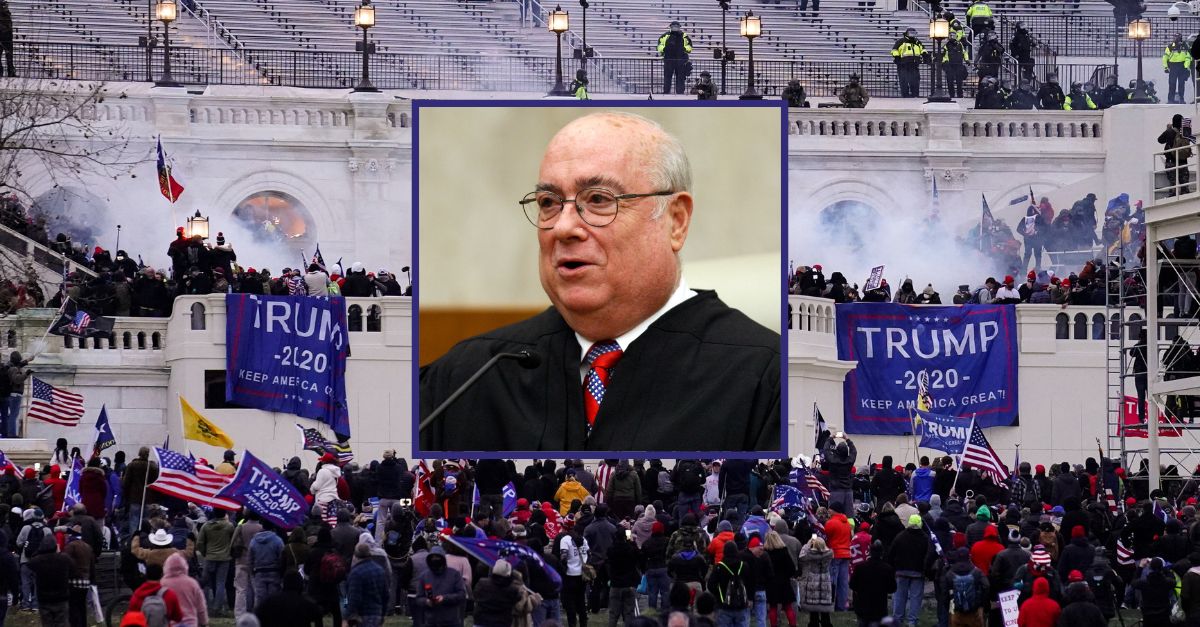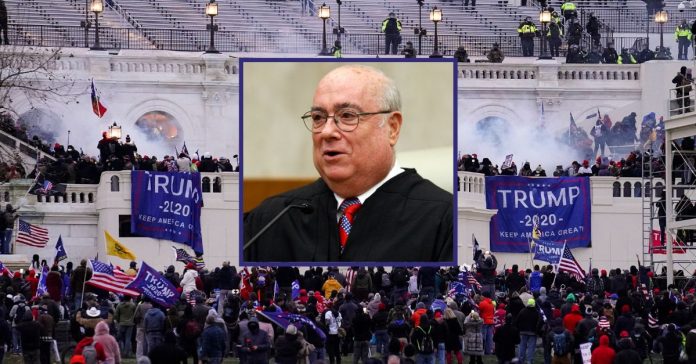
FILE – Violent rioters loyal to President Donald Trump storm the Capitol in Washington on Jan. 6, 2021 (AP Photo/John Minchillo, File). Inset: FILE – In this May 1, 2008 file photo, U.S. District Judge Royce C. Lamberth is seen during a ceremony at the federal courthouse in Washington. (AP Photo/Charles Dharapak, File).
A federal judge who has been on the bench for decades is ringing the alarm over what he says is a mainstream reframing of what happened at the U.S. Capitol on Jan. 6, 2021.
In an emphatic address during a resentencing hearing, Senior U.S. District Judge Royce Lamberth decried the soft-pedaling of the violent actions of the Jan. 6 mob, when thousands of Donald Trump supporters overwhelmed police and broke into the Capitol building as Congress had begun to certify President Joe Biden’s 2020 presidential win. The breach forced lawmakers to either flee the building or shelter in place for hours. Lamberth, a Ronald Reagan appointee, says that referring to the violence as little more than a harmless political demonstration — when it was actually a deadly, costly riot that temporarily brought the peaceful transfer of presidential power to a temporary halt — is both baffling and dangerous.
Lamberth issued his statement at a resentencing hearing for James Little, who, as Law&Crime previously reported, was sentenced in March 2022 to 60 days in jail and three months probation after pleading guilty to a misdemeanor disorderly conduct charge. Little appealed the sentence, arguing that so-called “split sentences” of both jail and probation were not allowed for that type of misdemeanor, and the U.S. Circuit Court for the District of Columbia ruled in his favor in August.
Little had asked Lamberth to end his probation early, as he had already served two months behind bars. On Thursday, Lamberth denied that request, instead ordering a Little to serve 120 days in jail — twice the original term, although Little will not serve that long, as Lamberth credited the defendant 60 days for time served plus an additional 30 for time he has spent on probation so far.
Lamberth said Little’s apparent lack of remorse played a significant role in his decision — a trend that the judge noted goes beyond the defendant himself.
“The Court is accustomed to defendants who refuse to accept that they did anything wrong,” Lamberth said, according to notes filed on the public docket. “But in my thirty-seven years on the bench, I cannot recall a time when such meritless justifications of criminal activity have gone mainstream.”
Lamberth continued:
I have been dismayed to see distortions and outright falsehoods seep into the public consciousness. I have been shocked to watch some public figures try to rewrite history, claiming rioters behaved “in an orderly fashion” like ordinary tourists, or martyrizing convicted January 6 defendants as “political prisoners” or even, incredibly, “hostages.” That is all preposterous. But the Court fears that such destructive, misguided rhetoric could presage further danger to our country.
Lamberth said that as he “cannot condone the shameless attempts by Mr. Little or anyone else to misinterpret or misrepresent what happened,” it falls to him to “set the record straight.”
“On January 6, 2021, a mob of people invaded and occupied the United States Capitol, using force to interrupt the peaceful transfer of power mandated by the Constitution and our republican heritage,” he said.
The judge continued (emphasis in original, citations omitted):
This was not a protest that got out of hand. It was a riot; in many respects a coordinated riot, as is clear from cases before me including Hostetter and Worrell. “Protestors” would have simply shared their views on the election — as did thousands that day who did not approach the Capitol. But those who breached and occupied the Capitol building and grounds halted the counting of the Electoral College votes required by the Twelfth Amendment. The rioters interfered with a necessary step in the constitutional process, disrupted the lawful transfer of power, and thus jeopardized the American constitutional order. Although the rioters failed in their ultimate goal, their actions nonetheless resulted in the deaths of multiple people, injury to over 140 members of law enforcement, and lasting trauma for our entire nation. This was not patriotism; it was the antithesis of patriotism.
And the rioters achieved this result through force. Not everyone present that day was violent, but violence is what let them into the Capitol. At first, a police line protected the Capitol, but eventually law enforcement was subjected to such force by such a mass of people that the rioters pushed through. Upon entering the Capitol, many rioters vandalized and looted, some hunted for members of Congress.
And even those who say they simply wandered around the building still played a meaningful role in the events of that day.
As for Little, Lamberth noted that despite spending some 18 months on probation, Little “has spent essentially no time in compliance with the terms and conditions of his probation,” and that the defendant’s own public statements make it clear he doesn’t regret what he did.
“Mr. Little’s public commentary indicates a clear lack of remorse,” the judge said. “Instead, his social media posts show that Mr. Little has sought to downplay the attack on the Capitol while minimizing or denying his personal responsibility.”
Lamberth specifically noted Little’s reference to so-called “QAnon shaman” Jacob Chansley, himself a defendant before Lamberth, as a “fellow persecuted and prosecuted J6 Patriot,” and took issue with it.
“I happen to be the Judge who had Mr. Chansley’s case, and I know that he was neither persecuted or prosecuted, improperly or unlawfully,” Lamberth said.
Lamberth also doubled down on the sentiment he expressed during Little’s original sentencing hearing, when he said that a time of incarceration — even for a misdemeanor — can be “essential” in Jan. 6 cases.
“The Court wishes to emphasize something: Misdemeanors can be serious crimes,” Lamberth said in his Thursday filing (emphasis in original).
Lamberth also dismissed Little’s assertion that the defendant’s free speech rights were under attack.
Let me add one more thing. According to the defendant, the criminal justice system has denied him his freedom of speech. Of course, Mr. Little has a right under the First Amendment to believe that the 2020 presidential election was stolen. He has a right to express that view today, and he had a right to do so on January 6th as well. He even has a right to argue that this was a politically motivated prosecution. But the First Amendment does not give anyone the right to enter a restricted area or to engage in riotous activity in the Capitol. In resentencing Mr. Little on the count to which he pleaded guilty, the Court is not suppressing his constitutional right to freedom of expression. For Mr. Little to style himself a political prisoner and to accuse the Court of infringing his rights is not only incorrect, it is offensive to the Court. The public should understand that such notions are preposterous.
“This is a matter of right and wrong,” Lamberth continued, adding that Little “cannot bring himself to admit that he did the wrong thing,” although he took steps in that direction.
“So, it is up to the Court to tell the public the truth: Mr. Little’s actions, and the actions of others who broke the law on January 6th, were wrong. The Court does not expect its remarks to fully stem the tide of falsehoods. But I hope a little truth will go a long way.”
Have a tip we should know? [email protected]

